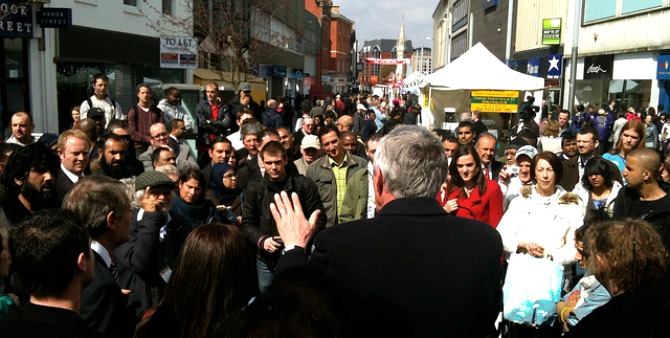 Matthew Flinders offers his opinion behind Dominic Cummings’s recent resignation and the reasons he believes British politics may not have seen the last of him.
Matthew Flinders offers his opinion behind Dominic Cummings’s recent resignation and the reasons he believes British politics may not have seen the last of him.
Little did I know when I argued recently that the time had come for the Prime Minister to ‘ditch Dominic Cummings’ that within 24 hours my suggestion would have been accepted. I’m not naïve enough to think my comments had any bearing on the unfortunate series of events that appear to have unfolded in No.10, just as I am not naïve enough to believe for one minute that we have seen the last of Dominic Cummings.
Cummings has not gone. He’s just re-entered the political shadowlands from whence he came. Just as the notion of the ‘Boris bounce’ has come to encapsulate the prime minister’s capacity to rise from the ashes I expect a ‘Cummings comeback.’ The ‘return of the Dom’ will undoubtedly be a relatively off-stage affair but that was arguably always the way he felt most effective. Hurling abuse, throwing threats, chucking rocks over the wall and waiting to hear the sound of smashing glass (reminds me of someone else).
The ‘Boris and Dom’ partnership was always going to be a fairly volatile affair. Both needed what the other had to offer and became trapped in an almost parasitical relationship the strength of which looked almost bizarre when the Prime Minister protected Cummings of menacing after he’d taken an ill-judged and publicly damaging trip to Barnard Castle. The legacy of that trip has cast a long and dark shadow over public confidence in the government and yet Boris stood stubbornly by his man.
Why did Boris appear to be so dependent on Cummings? The answer, I suggest, exists in the personality of the Prime Minister. Boris is a man who needs to be loved. He hates to be the bearer of bad news and he cannot stand direct confrontation. Even the current confusion as to whether Boris actually offered Lee Cain the role of Chief of Staff is mired in the confusion that comes from the Prime Minister’s predilection to please whoever is standing in front of them. In light of this, Boris and Cummings made an odd but at least understandable duo. It was good-cop-bad-cop. Cummings ruffled the feathers, came up with ideas and had an interest in ‘managing the machine’ of Whitehall; Boris liked to build people back up, had a lot on his mind (personally and professionally) and has never had any interest at all in the procrustean realities of making government work.
And apparently in the wake of Cummings’s departure, the Prime Minister is about to love-bomb the environment, the North of England and Tory backbenchers as part of what has been variously characterised as a ‘re-set’, ‘fresh-start’ or ‘new chapter’. Whether the European Union will benefit from this more ‘sharing, caring, listening approach’ is more doubtful. What is less doubtful is that in politics ‘love costs’ and with the national debt already heading to eye-watering levels the Prime Minister’s room for manoeuvre is limited and the stresses and strains with the Chancellor are increasingly obvious.
It’s also worth remembering that Boris has always been an outsider and in many ways he levered that reputation in order to lever himself into power. Put slightly differently, unconventional times called for an unconventional politician with an unconventional chief adviser. It’s possible to suggest that neither Conservative Party MPs or those members of the public in the ‘red wall’ constituencies who ‘lent him their support’ did so with any great conviction. The inevitable risks that came with Boris were ‘costed in’ to a relatively fragile political equation, and extending the deal, as the letter from the Northern Research Group demonstrated, depends on him demonstrating stability and competence alongside making good on his ‘levelling-up’ commitments. If Cummings’s departure marks a shift in power within No.10 then it is to a gifted but relatively unknown adviser in the form of Munira Mirza that I’d expect Boris to turn.
And what about ‘the Cummings comeback’? Why am I so sure that the permanent secretaries in Whitehall and the Tory MPs of Westminster might have been a touch too premature in celebrating Dom’s departure The first reason is because in a lot of areas, Cummings was correct. Many of the issues and themes that he sought to raise – about, for example, institutional churn, the need for new skills, the existence of implicit biases and a generally risk-averse culture – are all valid issues which have become more obvious in light of the COVID challenge. It was the way he raised these issues and the manner in which he adopted a supercilious tone mixed with technological fervour that undermined his capacity to actually deliver change.
The second reason that Cummings is likely to remain on the political landscape is because his thinking is embedded in a number of projects that have already developed a degree of momentum. Ministers appear committed to establishing a new £800m Advanced Research Projects Agency which was a Cummings brainchild; while the think tank GovernUp is midway through a national Commission on Smart Government that is explicitly focused upon many of Cummings’s arguments about the potential of technology, big data, and algorithmic governance. Extracting Cummings from No.10 is likely to be far easier than extracting his thinking and influence from the wider state structure.
And then, of course, there is the man himself and the final reason that Cummings is likely to come again – whether you love him or loathe him it’s hard to admit that somewhere deep inside a complex mind is an unquestionable talent for disruption. And now that talent is super-charged with a detailed knowledge of the dysfunctionality of Whitehall and the personal frailties of the Prime Minister.
___________________
 Matthew Flinders (@politicalspike) is Founding Director of the Sir Bernard Crick Centre and Professor of Politics at the University of Sheffield.
Matthew Flinders (@politicalspike) is Founding Director of the Sir Bernard Crick Centre and Professor of Politics at the University of Sheffield.
Featured image credit: “Prime Minister Boris Johnson arrives at Downing Street” by UK Prime Minister, licensed under CC BY-NC-ND 2.0







